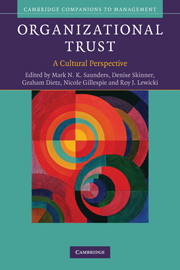Book contents
- Frontmatter
- Contents
- List of figures
- List of tables
- Note on editors
- Note on contributors
- Foreword
- Editors' acknowledgements
- Part I The conceptual challenge of researching trust across different ‘cultural spheres’
- 1 Unravelling the complexities of trust and culture
- 2 Trust differences across national–societal cultures: much to do, or much ado about nothing?
- 3 Towards a context-sensitive approach to researching trust in inter-organizational relationships
- 4 Making sense of trust across cultural contexts
- Part II Trust across different ‘cultural spheres’: inter-organizational studies
- Part III Trust across different ‘cultural spheres’: intra-organizational studies
- Part IV Conclusions and ways forward
- Index
- References
2 - Trust differences across national–societal cultures: much to do, or much ado about nothing?
Published online by Cambridge University Press: 05 June 2012
- Frontmatter
- Contents
- List of figures
- List of tables
- Note on editors
- Note on contributors
- Foreword
- Editors' acknowledgements
- Part I The conceptual challenge of researching trust across different ‘cultural spheres’
- 1 Unravelling the complexities of trust and culture
- 2 Trust differences across national–societal cultures: much to do, or much ado about nothing?
- 3 Towards a context-sensitive approach to researching trust in inter-organizational relationships
- 4 Making sense of trust across cultural contexts
- Part II Trust across different ‘cultural spheres’: inter-organizational studies
- Part III Trust across different ‘cultural spheres’: intra-organizational studies
- Part IV Conclusions and ways forward
- Index
- References
Summary
Summary
Does trust and its development, functions and meaning, differ between people from different national–societal cultures? There is considerable anecdotal evidence and some theoretical argumentation to suggest it does, but are these supported by empirical research? This chapter reviews the available empirical evidence on the effects of national–societal culture on interpersonal trust. It focuses largely on quantitative empirical evidence to consider the extent to which, and the ways in which, interpersonal trust differs across national–societal cultures. In every category of our review we found evidence of cross-cultural differences, particularly on generalized trust, and also evidence of trust universals across cultures. In evaluating these findings, we conclude that trust may operate as a variform universal and variform functional universal. We conclude with two proposed routes for future research, and implications for practice.
Introduction
To an ever-increasing extent, ‘work’ involves close interaction and cooperation with people who come from a national–societal cultural background different from one's own. This emerging reality of work can be attributed to a number of factors. First, with the unrelenting advance of globalization, more and more organizations are taking a global approach to operations, including the operation of overseas international joint ventures and alliances, working with offshore suppliers and customers, and conducting global searches for talent. Second, the advance of communication technologies such as e-mail and videoconferencing has fostered a movement toward global virtual teams involving individuals from a variety of different cultural backgrounds.
- Type
- Chapter
- Information
- Organizational TrustA Cultural Perspective, pp. 42 - 86Publisher: Cambridge University PressPrint publication year: 2010
References
- 62
- Cited by

